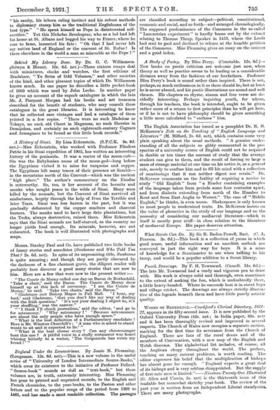The English Association has issued as a pamphlet Dr. R.
B. McKerrow's Note on the Teaching of " English Language and Literature" (H. Milford, 2s. 6d. net), which contains some very plain speaking about the usual methods. " A genuine under- standing of all the subjects so glibly enumerated in the pro- spectus of a university course of English could not be acquired in double or ten times the amount of study that the average student can give to them, and the result of forcing so large a mass of strange material at one time on his notice is, as a general rule, merely to confuse him and to fill his mind with a collection of smatterings that it can neither digest nor retain." Dr. McKerrow comments on the futility of requiring a novice to study " Old English " from " a Reader containing examples of the language taken from periods some four centuries apart, and from dialects extending from north of the Humber to Kent and from East Anglia to Wessex." The case of "Middle English," he thinks, is even worse. Shakespeare.is only known to most people in modernized texts. Dr. McKerrow insists on the value of phonetics in the study of our language and on the necessity of considering our mediaeval literature—which in itself is mostly poor stuff—in close relation to the literature of mediaeval Europe. His paper deserves attention.










































 Previous page
Previous page